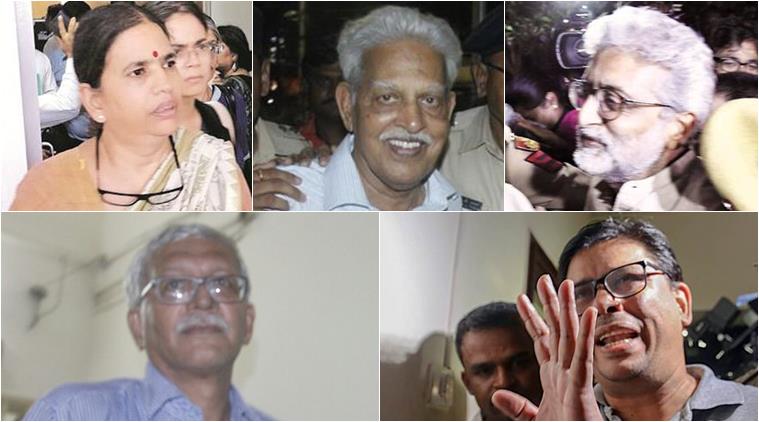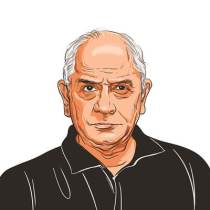Dissent Is Democracy
Arrest of activists casts a shadow over state’s commitment to constitutional values

Pune police arrested (Clockwise) Sudha Bharadwaj in Faridabad, Varavara Rao in Hyderabad, Gautam Navlakha in New Delhi, Vernon Gonsalves and Arun Ferreira in Mumbai.
Written by L Ramdas
I am a former fauji who retired as Chief of the Naval Staff on September 30 1993. I joined the Joint Services Wing, Clement Town, Dehra Dun, as a callow youth of 15 years and four months in January 1949 and after 44 years and some months in white uniform, fell out the other end as the head of a wonderful service at the age of 60. I was thus uniquely privileged to be part of and to “bear witness” to the growth and progress made by independent India. One of the main events that comes to mind is the transition we made from that of being a dominion in the British Commonwealth to an independent, sovereign, democratic Republic, whilst we were still cadets at the Joint Services Wing.
It was after nearly two years of intensive debate amongst the members of the Constituent Assembly of India that India adopted her Constitution on November 29, 1949 and this came into effect on January 26, 1950, the day we celebrate as Republic Day.
The Constitution assured every Indian citizen, irrespective of religion, caste or community, all the fundamental freedoms and rights, as indeed duties and responsibilities. It was one of the most progressive and remarkable documents produced under the stewardship of Babasaheb Ambedkar and his team of eminent, critical and intellectually mature men and women, who were able to translate the hopes and dreams of millions into a vision document spelling out the framework for a democratic, just and inclusive India.
For those of us who had joined the armed forces of a newly independent nation, it was an exhilarating moment. And when we were commissioned as officers in 1952 and 1953, it is to that Constitution that we swore our allegiance. Indeed every civil servant, politician and those holding public office does likewise, starting with the highest in the land, the President of India, who is also the Supreme Commander of the Armed Forces.
Seven decades down the line — while much has been done and achieved of which our nation can justifiably be proud — there are serious concerns about the core values we had also set out for ourselves. I refer here to the freedom of thought, expression, and religion, and the fundamental premise on which a healthy democracy is based — namely, the right to equality regardless of caste, faith and gender, and the responsibility to voice dissent and uphold our secular and inclusive polity in such a manner that the last woman or man is never excluded or exploited.
The steady erosion of these basic pillars of our democracy — as embodied in the executive, legislature and judiciary — has led to the present visible decline in following the basic norms, which have always guided our institutions. This has been exemplified in recent times by several anti- and un-democratic actions by the state, and increasingly, by non-state actors, as seen in the mob lynchings and other such manifestations of the breakdown of law and order.
The latest glaring display of this has been in the totally unwarranted and illegal manner in which five well-known human rights activists have been pursued and arrested by the Pune police from several locations across the country in total violation of their fundamental rights and the law of the land for crimes, which appear to be totally unspecified and unsubstantiated.
The latest glaring display of this has been in the totally unwarranted and illegal manner in which five well-known human rights activists have been pursued and arrested by the Pune police from several locations across the country in total violation of their fundamental rights and the law of the land for crimes, which appear to be totally unspecified and unsubstantiated.
As a citizen and a service veteran, I feel it is my sacred duty to express my deep distress and concern, especially when too many of us, in keeping with one of the traditions with which we in uniform were trained, are silent. Our silence is not to be mistaken for consent. Large numbers of veterans are deeply unhappy with the turn of events in our republic. There are some of us who have written open letters to the highest in the land, sharing our concerns.
I am happy that in its wisdom, the Supreme Court has put a stay on these arrests. I can only echo the words of the judge who has firmly upheld one of the pillars of any democratic system when he says, “Dissent is the safety valve of democracy”.
The writer is a former chief of the Indian Navy







































No hay comentarios:
Publicar un comentario